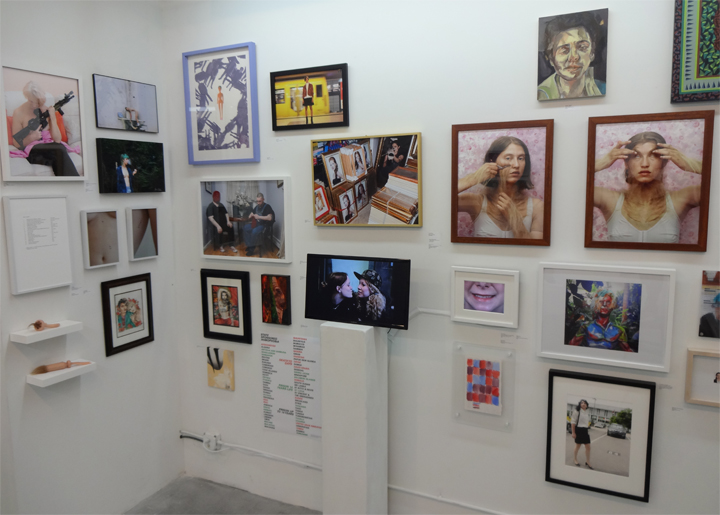My video, You’d Look Prettier if You Smiled More, will be on view as part of a group exhibition curated by artist, activist and educator, Lorenzo Triburgo at Amos Eno Gallery in Brooklyn, NY. The exhibition will be on view July 11-27, 2019.
An opening reception will be held on Friday, July 12 from 7-9 PM at the gallery’s location at 56 Bogart Street in Brooklyn, NY. A closing performance event will be held on Friday, July 26, 7-8:30 PM.
Please read more about the exhibition below:
Amos Eno Gallery is pleased to present The Social Policing of Gender and the Criminalization of Queerness, a group exhibition of works selected by Guest Juror Lorenzo Triburgo. An opening reception will be held on Friday, July 12 from 7-9 PM at 56 Bogart Street in Brooklyn, NY.
This exhibition is based on a call for works that address ‘gender policing’ in both the tacit, subtle ways that impact everyday life and through systemic institutional punishment. The exhibition will feature a range of voices from the Brooklyn community, incarcerated and formerly incarcerated individuals as well as national participants. Triburgo is a Brooklyn-based multimedia artist, activist, and educator whose practice encompasses performance, photography, video and audio. The exhibition will be held at Amos Eno Gallery, a nonprofit art gallery in Brooklyn dedicated to promoting contemporary work by emerging and mid-career artists.
Featuring works by: Maryamsadat Amirvaghefi, Garth Amundson & Pierre Gour, Kyle Anderson, David Andersson, Elise Askonas, Nomi Beesen, Laura Boban, Julia Bradshaw, Jessica Burke, Keith Buswell, Mack Carlisle, Deric Carner, William Chambers, Sarawut Chutiwongpeti, Mia Cinelli, Peter Clough, Mary Cobb, Robyn Day, Lou Eberhard, Jesse Egner, Jason Elizondo, James Falciano, Marico Fayre, Jon Feinstein, Lila Freeman, Guta Galli & Aaron Wilder, Ebenezer Galluzzo, Nicole Gamboa, Lindsay Garcia, Robert Gordon, Julie Green, Rebecca Hackemann, Ryan Halliwill, Vanessa Haney, James Horner, J Houston, Rainn Jackson, Axel Jenson, Everett Kane, Ann Kaplan, Brittany Knapp, Vaughan Larsen, Christopher Lineberry, Katie Loebach, Billi London-Gray, Jordan McGirk, Charlie J. Meyers, Sara Minsky, Slava Mogutin, Andrew Norris, Marc Ohrem-Leclef, Stephanie Paine, Julie Rae Powers, Vick Quezada, Kyle Quinn, Rowan Renee, Gabriel Garcia Roman, Alex Dolores Salerno & Francisco Eraso Jr., Benjamin Saulnier, Pastor Isaac Scott, Rafael Soldi, Clark Stoeckley, Billie Stultz, Rebecca Jean Sutton, Ilona Szwarc, June T Sanders, Britt Thomas, Alan Vincent, Jan Wandrag, Sadie Wechsler, Kaylee Weyrauch, Milo Wissig, Guy Woodard, and Xue Zheng.
Juror statement:
This exhibition seeks to address the ways we experience and resist gender policing - from the seemingly innocuous (such as distinct “men’s” and “women’s” departments in clothing stores or the objectification of queers in ‘well-meaning’ media outlets) to the overtly punishing (systemic violence and imprisonment).
In the U.S. today, gender variant youth are given longer sentences than their counterparts and are required to demonstrate “gender appropriate” (such as walking “like a man”) in order to be released. Queer adults in the prison system also face longer sentencing, are more likely to be sentenced to death, and suffer violence at higher rates than other prisoners.
It is important to recognize that the social policing of gender is a critical part of what fosters the literal criminalization of queerness.
In a socio-political climate where the president of the United States actively seeks to deny the existence of transgender individuals, gains in civil rights legislation are being rolled-back, and the prison industrial complex continues to grow like a weed, it is an imperative that artists play the role of radical historians and create space for imagined futures.
As such — How do we confront and resist the criminalization of queerness and gender-nonconformity in our personal lives, dominant narratives within the media, and within our social, political and economic structures?
This exhibit will present a wide range of creative approaches to its themes in an attempt to reflect the equally wide-ranging experiences of gender nonconformity.


